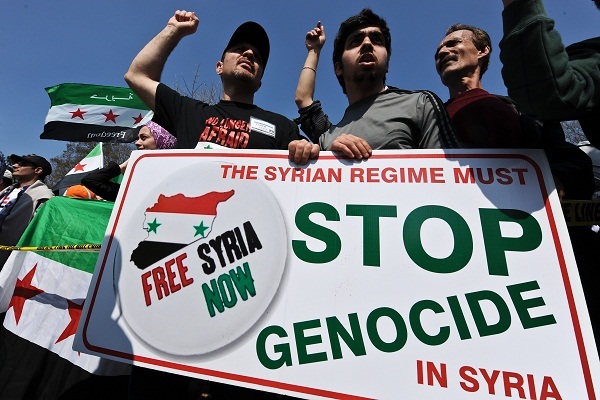The slaughter of the innocents in Houla, Syria, has concentrated the West’s collective mind. The Times declares (£), not unreasonably, that there is a desire to stop what the UN, while making Robert Mugabe its tourism envoy, has tepidly described as ’18 months of violence’. The paper adds that ‘all options are on the table’.
Western voices are emitting decibels of disgust. Secretary of State Clinton has castigated the Russian regime for its intransigence in the Security Council, and has said that Russia’s policy will ‘contribute to a civil war’. Meanwhile, Senator John McCain has repeated his view that the Obama administration’s inaction on Syria denies what it is to be American.
From the demoralised European perspective, it is heartening to see Americans on both sides of their bitter political divide assume moral leadership. The European Union has introduced sanctions (albeit after an internal wrangle that reeked of self-interest), and Britain, France and Germany have worked to forge a wider coalition against the Assad regime. But America will be vital in stopping the slaughter, either by means of diplomacy or arms.
For all the sudden resolve, however, the West remains in a club of its own on Syria. This has prompted Lord Ashdown to write a piece (£) urging western leaders to calm their rhetoric and seek a solution in which the willing Turkish government can lead a relief effort. Ashdown’s point is that the West has neither the divisions nor the moral authority to act alone.
There are echoes in Ashdown’s piece of Anthony Jay and Jonathan Lynn’s famous line, ‘Once you start interfering in the internal squabbles of foreign countries, you are on a very slippery slope’. The line was meant to rib Britain’s post-imperial mentality, but caution can be laudable. The leading article in the Jubilee double issue of the Spectator (subscribers click here, non-subscribers buy it here) argues that there are too many unknowns in Syria, and that, therefore, discretion is the better part of valour. Syria is a country of enormous ethnic and religious diversity. The danger of exacerbating those tensions, which are already evident in the present conflict, is too great — and the West can ill-afford to precipitate another bloodbath in the Middle East, no matter how well intentioned.
Our understanding is not lacking in Syria alone but across the whole Middle East. In the current issue of the magazine, Peter Oborne reports from Libya, where a civil war seems to be mounting as the inert government grows weaker (subscribers click here). Reporters in other countries tell similar tales. Eliza Griswold, a veteran of 10 years reporting in Africa and the Middle East, told me recently that American enthusiasm for the Arab Spring has waned in the face of resurgent Islamism and human rights abuses. Her warnings have been borne out by events in Egypt, where the population has landed itself with a choice between one of Mubarak’s henchmen and the Muslim Brotherhood. In the world of academia, Alexander Meleagrou-Hitchens recently reviewed Tariq Ramadan’s account of the Arab Spring for the Spectator’s books blog; he could not share Ramadan’s blithe assertions about the spread of liberalism, citing lack of evidence. Events and uncertainty are battering our initial euphoria into scepticism and worry.






Comments